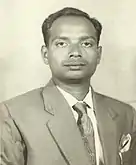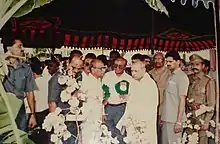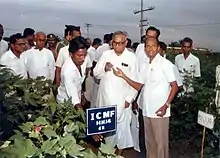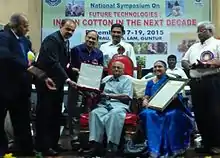Kaderbad Ravindranath
Kaderbad Ravindranath (born 4 January 1936) is an Indian agricultural research scientist and cotton breeder. In 2015, he received the Life Time Achievement Award for his contributions to the cotton research.[1][2][3][4]

He developed a new cotton variety named Narasimha which is used as a parent line for cotton hybrid seed programs. The hybrids made of Narasimha are cultivated in over 10 million acres contributing a tax amount of Rs 3 billion on sale of cotton and seed.[5]
Early life and education

Kaderbad Ravindranath was born in Nandyal in Madras Presidency of India on 4 January 1936, to Sri Kaderbad Narasinga Rao and Smt. (Karanam) Adi Lakshamma. He grew up in a family of seven brothers and two sisters. His father Sri Kaderbad Narasinga Rao was a philanthropist, social reformer, freedom fighter and chairman of the Nandyal Municipality for 14 continuous years.
He graduated from Presidency College, Chennai with B.Sc. in biology. He earned a B.Sc. in agriculture from Agricultural College, Bapatla, and a M.Sc. in agriculture from Acharya N.G. Ranga Agricultural University (ANGRAU), Hyderabad, with specialization in genetics and plant breeding.
Regional Agricultural Research Station

He worked at the Acharya N. G. Ranga Agricultural University (ANGRAU) Regional Agricultural Cotton Research Station for 36 years from 1959 to 1996 in various capacities. He published more than 60 scientific papers in the Indian Journal of Plant Breeding and Genetics, Journal of Indian Society for Cotton Improvement, Madras Agricultural Journal, Andhra Agricultural Journal, as well as several review papers pertaining to cotton improvement.[6][7]
During his work at ANGRAU, he developed ten new cotton varieties (Narasimha, Aravinda, Big boll hirsutum cotton-HYPS 156, and others) and two hybrids (NHH 390 and NCA 216) of cotton, which were released and notified by the Central Variety Release Committees of the Indian government.[8][9][10][11][12] The Narasimha variety was used as a parent line in a number of hybrids, while NCA-216 was developed for increased yield under rain-fed conditions.[13]
He also participated in radio programs on All India Radio stations for Kadapa and Kurnool to advise farmers in cotton cultivation. He conducted more than 40 training programs to extension staff of the Department of Agriculture of Andhra Pradesh, and trained farmers in cotton cultivation under the Andhra Pradesh Well Project and the WALAMTARI organization.[14]
ICMF-CDRA

From 1985 to 1990, he deputised to the Indian Cotton Mills Federation – Cotton Development and Research Association (ICMF-CDRA) as a cotton research officer. He established a cotton research and development center at Nandyal and served as its head. He again served as the head of the research center from 1996 to 2000 (after retiring from ANGRAU)
He developed 500 germ-plasm lines for use in cotton breeding program. During this time he developed two cotton varieties (ICMF-4 and ICMF-6) and two cotton hybrids (ICMF-HH.8 and ICMF- HH.14).[15][16][17][18][19]
He also developed a new technique of emasculation (copper straw method) to enhance the setting of crossed bolls up to 72% in Desi cotton (native breed).[20]
In 1999, he visited European countries for one month to visit research stations and give lectures on the latest breeding techniques in cotton.[7][21][22]
In 2001, he was sponsored by the Agricultural Research Management Project (ARMP-TA) by the Winrock International Institute for Agriculture Development and visited Bangladesh for two months to formulate a five-year technical program on cotton breeding to improve cotton yields.[23][24]
Bharathi Seeds
As of 2002, he was working as the executive director of research at Bharathi Seeds.[6]
He developed an inter-se-hirsutum versatile superior cotton hybrid, Brahma which was the first hybrid cultivated by farmers from the private sector since 1997, with a claimed yield potential of 32 quintal per hectare.[25]
He also developed a superior hirsutum cotton hybrid, "ATAL" with a claimed yield potential of 34 quintals per hectare.[26]
He also developed a 'mixed pollen technique' to induce variability and genetic diversity in cotton using mixed pollen of desired types for developing genotypes with drought tolerance, big boll, fiber length with strength, and pest tolerance coupled with higher yield[27]
Family
He is married to Smt. Prasoona. They live at Nandyal. They have four children and six grandchildren.
Social service
Since 1997, he has served as the chief advisor of Nandi Rythu Samakya, which provides advice and help to poor and marginalised farmers in sustainable cultivation practices.[28]
He is the honorary president of Brahmin Seva Samakya,[29] president of Matrubasha Parirakshana Samithi, president of the Nandyal Library Association, and president of the Agricultural University Retired Teachers Association, Nandyal.
He received "Gadicherla Foundation" award for social service.[30]
Awards

- Lifetime Achievement Award by Cotton Research and Development Association[3][31][32]
- Dr. I.V. Subba Rao Memorial Award[33]
- Acharya N.G. Ranga Agricultural University Best Scientist/Breeder award[34]
- Best Scientist Award from Kakani Venkataratnam Farm Foundation, Vijayawada[35]
- Sri Bharathiyudu Award[36]
- Gadicherla Foundation Award for Social Service[30]
References
- Cotton Research and Development (CRDA): Life Time Achievement Award
- Narasimha development contributes to the Life Time Achievement Award Sakshi (newspaper) (Telugu newspaper) 22-Dec-2015
- Life Time Achievement Award for Cotton Research Scientist Andhra Jyothy (Telugu newspaper) 22-Dec-2015
- Cotton Researcher is a Magnet for Awards Eenadu (Telugu newspaper) 30-Dec-2015
- "Scientist's work earns Rs. 300 crore to the Exchequer: The hybrids made of "Narasimha-cotton" are cultivated in over one crore acres contributing a tax amount of 300 crore on sale of cotton and seed", The Hindu (newspaper), 1-April-2014
- Scientist strives to add luster to white gold Vaartha (Telugu newspaper) 10-Feb-2002
- American farming is totally mechanized Vaartha (Telugu newspaper) 10/8/2006
- NHH-390 High yielding cotton variety Vaartha (Telugu newspaper) 19-7-97
- Recognition for Cotton Scientist in Research Andhra Jyothy (Telugu newspaper) 11-Oct-2013
- K. Ravindranath, "NA-920 A New Promising Cotton variety" The Hindu 4-Dec-1985
- Cotton Scientist Ravindranath Facilitated (Udhayam, Telugu newspaper), 27-Nov-1988
- Special Status for Nandyal in Cotton Research Andhra Jyothy (Telugu newspaper) 5-Oct-2014
- K. Ravindranath, et al., "NCA-216 Promising Desi Cotton Hybrid for Rayalaseema region", research note, Journal of research, ANGRAU, 2000
- WALAMTARI organization belongs to the Department of the water, land, and soil management. It develops best practices to increase the production and productivity with minimum water management and reduce the cost of cultivation in cotton crop to help farmers from villages
- ICMF-4 and ICMF-6: Two high yielding cotton varieties Jameen Rythu (Telugu weekly, Nellore) 28-December-1987
- Governor Kumud Ben Joshi praises the research at ICMF Andhra Jyothy (Telugu newspaper) 12-Mar-1998
- Vice chancellor of Agricultural University Visits ICMF farm Andhra Prabha (Telugu newspaper) 24-Nov-1998
- Bihar Governor visits cotton research station Andhra Prabha (Telugu newspaper) 13-November-1987
- Training program for cotton farmers (Udhayam (Telugu newspaper), 1-Jul-1989
- K. Ravindranath, et al., "Copper straw method: A new technique for hybrid cotton seed production", ICMF Journal, Bombay, Apr 1998
- Farmers tour European countries to see latest farming practices Vaartha (Telugu newspaper) 17-May-1999
- Organic fertilizers play a major role in Europe's agriculture Vaartha (Telugu newspaper) 28-June-1999
- Farmers need to cut down the cost of cultivation Andhra Prabha (Telugu newspaper) 27-Jul-1998
- Bangladesh accelerates research on high yielding cotton varieties Vaartha (Telugu newspaper) 1-Apr-2001
- K. Ravindranath, et al., "Brahma- a high yielding cotton hybrid with special features", Annual report of Bharathi Seeds Pvt. Ltd, May 2010, pp42-43
- R & D reports of Bharathi seeds Pvt. Ltd, India 2016
- R & D reports of Bharathi seeds Private Ltd, India 2013
- Nandi Rythu Association Strives to solve farmers’ problems Andhra Bhoomi (Telugu newspaper) 29-Nov-2004
- Scientist Ravindranath's Research is commendable Sakshi (newspaper) (Telugu newspaper) 3-Jul-2012
- Contributions of Gadicherla will endure for long time Sakshi (newspaper) (Telugu newspaper) 15-Sep-2014
- "Narasimha development contributes to the "Life Time Achievement Award" " Sakshi (newspaper) (Telugu newspaper) 22-Dec-2015
- Cotton Scientist facilitated Andhra Jyothy (Telugu newspaper) 1-May-2016
- Cotton Scientist receives "Rythu Nestham" award Andhra Jyothy (Telugu newspaper) 30-October-2015
- Scientist who made the Nandyal Cotton research station famous Eenadu (Telugu newspaper) 30-March-1997
- Kakani Venkata Ratnam award for International Scientist Vaartha (Telugu newspaper) 16-Jan-2002
- Role model for budding scientists Sakshi (newspaper) (Telugu newspaper) 15-Oct-2012